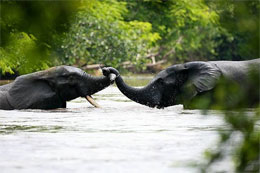
This post was written by guest blogger and Enough Project intern Emily Brandon.
For the first time, the United States has announced a National Strategy for Combating Wildlife Trafficking and a ban on the commercial trade of elephant ivory. This new strategy aims to “ensure that the United States is not contributing to poaching of elephants and illegal trade in elephant ivory.” Essentially, the U.S. ban prohibits commercial imports and exports in the hopes of leading a global effort to effectively protect and preserve our world’s wildlife and develop respect for the rule of law.The announcement also pledged to work closely with Congress to strengthen existing laws that combat wildlife trafficking and to adopt new ones to increase our ability to end this global challenge.
The international community must collaborate to end wildlife trade, especially China. According to an article by Jonathan Kaiman, “China accounts for 70% of global demand for ivory,” making it the “driving force” in crimes against endangered elephants. However, after months of international anti-trafficking investigations, Chinese ivory smuggler, surnamed Xue, was finally arrested in Nairobi, Kenya and extradited. The January 17th event is the first time the Chinese government has helped arrest a wildlife crime suspect overseas making it clear that coordinated local, national, and international efforts are crucial to ending the poaching crisis.
Elephant ivory has been reported to be an important resource to several armed groups throughout Central Africa, including the Lord’s Resistance Army (LRA). This past December, Robert, an LRA defector, told Enough staff, “We had our orders: kill the elephants, and give the tusks to our commanders to give to Kony. Those orders are still standing.” Across Eastern and Central Africa, the illicit sector generates hundreds of thousands of informal jobs and millions of dollars per year. At such a high rate of involvement, it is likely to put the elephant populations at great risk. TheWildlife Conservation Society has been instrumental in coordinating an international and domestic response to the crisis with the 96 ElephantsCampaign.
Adding to international pressure, the UN Security Council has significantly helped the mission to end wildlife trade with passing two resolutions in past January. The UNSC Resolution 2136 on Democratic Republic of Congo (DRC) and UNSC Resolution 2134 on Central African Republic (CAR), both reference poaching and encourage the continuation of regional and international efforts to counter the illicit trade. Although these two resolutions are major developments in the conservation movement, there is still more to be done. In an op-ed by Johan Bergenas from the Stimson Center, he argues that there must be a new U.S. policy towards counterterrorism in Africa, which includes the cessation of poaching, subsequently cutting off a vital source of generating funds for organized crime.
At this week’s London Conference on the Illegal Wildlife Trade, the hope is for government leaders to collaborate and continue to make this a high priority for the international community. It must be stressed that regional cooperation and economic integration is vital in tackling the exploitation of these natural resources.
For more information and policy recommendations from Enough’s work on this issue, see Sasha Lezhnev and Kasper Agger’s op-ed in The Hill and Mark Quarterman’s op-ed in CNN and Enough’s report, “Kony’s Ivory.”

